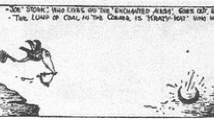Abstract
Radical black theology seems an unlikely subject for a study of Milton and popular culture. Yet connections between black theology and Milton span more than two hundred years. Whether aesthetically, as in Phillis Wheatley’s Poems on Various Subjects, or more didactically, as in David Walker’s Appeal, Milton’s Paradise Lost shapes the religious ethos underlying much of the African-American protest tradition. Until now, scholars have largely failed to take into account the importance of Milton’s Paradise Lost for African-American audiences.’ Such an oversight stems from an additional failure to take seriously the fact that African Americans read or were familiar with Milton, as well as sought to appropriate his writings.
Access this chapter
Tax calculation will be finalised at checkout
Purchases are for personal use only
Preview
Unable to display preview. Download preview PDF.
Similar content being viewed by others
Notes
The major exception, discussed above, is Carolivia Herron, “Milton and Afro-American Literature,” in Re-Membering Milton: Essays on the Texts and Traditions, ed. Mary Nyquist and Margaret W. Ferguson (New York: Methuen, 1987), 278–300. John Shawcross also raises questions about Milton’s black audience, noting, for instance, Miltonic allusions in Olaudah Equiano’s slave narrative as a mark of literary sophistication (see John Milton and Influence [Pittsburgh, PA: Duquesne University Press, 1991]).
Dolan Hubbard, The Sermon and the African American Literary Imagination (Columbia. MO: University of Missouri Press. 1994). 18.
Toni Morrison. Playing in the Dark (New York: Random House. 1992). 6–7.
Malcolm X, The Autobiography of Malcolm X (New York: Ballantine, 1992), 202. Subsequent in-text quotations of the Autobiography refer to this edition.
Malcolm X, Malcolm X Speaks (New York: Grove Weidenfeld, 1965), 65.
Albert J. Raboteau, A Fire in the Bones: Reflections on African American Religious History (Boston: Beacon Press, 1995), 4.
James H. Cone, Black Theology & Black Power (New York: Seabury Press, 1969). 117.
John Hope Franklin, From Slavery to Freedom, 7th ed. (New York: McGraw-Hill, 1994), 124.
Vincent Carretta. Introduction to Phillis Wheatley: Complete Writings, by Phillis Wheatley. Penguin Classics ed. (New York: Penguin Books, 2001).
Olaudah Equiano, The Interesting Narrative of the Life of Olaudah Equiano in The Classic Slave Narratives, ed. Henry Louis Gates, Jr. (New York: Mentor, 1987). 77.
See David Boocker’s “Garrison, Milton, and the Abolitionist Rhetoric of Demonization” in American Periodicals 9 (1999): 15–26
Anthony Barthelemy, Black Face Maligned Race: The Representation of Blacks in English Drama from Shakespeare to Southerne (Baton Rouge: Louisiana State University Press. 1987), 2.
Kim F. Hall, Things of Darkness: Economies of Race and Gender in Early Modern England (Ithaca NY: Cornell University Press 1995), 6.
Maureen Quilligan, “Freedom, Service, and the Trade in Slaves: the Problem of Labor in Paradise Lost,” in Subject and Object in Renaissance Culture, ed. Margreta de Grazia, Maureen Quilligan, and Peter Stallybass (Cambridge: Cambridge University Press, 1996), 213–34.
Frederick Douglass, My Bondage and My Freedom (1855); reprinted in Douglass Autobiographies (New York: Library of America, 1994).
Stanley Fish, Surprised by Sin, 2nd ed. (Cambridge: Harvard University Press, 1997) 10.
Walker, David Walker’s Appeal, rev. ed. (New York: Hill and Wang, 1965), 12, 43.
Editor information
Copyright information
© 2006 Laura Lunger Knoppers and Gregory M. Colón Semenza
About this chapter
Cite this chapter
Wilburn, R.A. (2006). Malcolm X and African-American Literary Appropriations of Paradise Lost . In: Knoppers, L.L., Semenza, G.M.C. (eds) Milton in Popular Culture. Palgrave Macmillan, New York. https://doi.org/10.1057/9781403983183_16
Download citation
DOI: https://doi.org/10.1057/9781403983183_16
Publisher Name: Palgrave Macmillan, New York
Print ISBN: 978-1-349-53364-0
Online ISBN: 978-1-4039-8318-3
eBook Packages: Palgrave Literature & Performing Arts CollectionLiterature, Cultural and Media Studies (R0)




